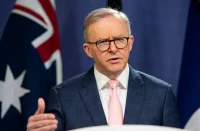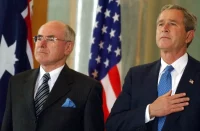Reuters just released a scandalous report jam-packed with statements from “unnamed sources” alleging that the Tripartite of Russia, Iran, and Turkey are conspiring to “dice Syria into spheres of influence”. Considering that it’s chock-full of unverifiable “statements” and rampant speculation, the article shouldn’t be taken too seriously and could very well be disinformation designed to weaken the developing multilateral partnership between these three Great Powers.
Nevertheless, it’s believable to some people because it touches upon some very real trends that other observers have previously picked up on. These are the tendency for some voices to favor a “federal” (internal partition) ‘solution’ to the War on Syria, the lingering talk about a “political transition” to push aside President Assad, and Iran’s presumable hesitancy to fully commit to the Tripartite. Because there are no solid answers to either of these concerns, rumors are able to take root and influence the overriding narrative about the conflict reconciliation process.
This analysis will thus address the three aforesaid issues as presented in the Reuters report in an attempt to get down to the bottom of what’s really going on. The points that were raised in the article are certainly provocative, and it’s worthwhile to explain, debunk, and counteract each of them. The author concedes that the situation is moving quite rapidly and that some of the scenarios mentioned in the agency’s text might unexpectedly unfold no matter how unlikely they may seem at the moment, which is why it’s necessary to study them and forecast their trajectory.
The first part of the research therefore begins by examining the “federal” (internal partition) plan that’s allegedly still in the cards and then segues into discussing the talk that President Assad might be pushed aside during the “political transition”. Next, the work then looks into some of Iran’s concerns about the Tripartite and the upcoming Astana negotiations. The second part of the series offers up some realistic suggestions for what the Syrian side should do in order to safeguard their sovereign interests in the event that some elements of the Reuters report turn out to be true. Finally, the last section is a summarized review of the previous two and is intended to serve as a reference source for the reader in reviewing all of the somewhat complicated details of the two preceding pieces.
Fighting Against “Federalization”
It’s become fashionable in many international relations and foreign policy circles to throw around “federalization” as a supposed ‘solution’ to seemingly intractable domestic conflicts, and Syria is of course no different. While this has long been pushed by the West, it’s also recently been mildly entertained by some factions in the Russian Ministry of Foreign Affairs, namely those which are predisposed to the Kurds as a result of Moscow’s decades-long relationship with this demographic. For as attractive or not as this ‘solution’ may have seemed to select Russian diplomats for a variety of reasons, the Russian-Turkish rapprochement completely changed this lobbying group’s calculation because it would obviously be detrimental to the national security interests of Moscow’s Great Power partner, to say nothing of the disaster that it would be for Syria itself.
 The establishment of a broadly independent “Kurdistan” in northern Syria would amount to the creation of a second geopolitical “Israel” which could then be used as a springboard for the projection of unipolar influence all across the region. Russia, Iran, Turkey, and Syria each understands how much of a threat this could be to the emerging Multipolar World Order, hence why they’re united in opposing it. Yet, if the Reuters article is to be believed, then the “federalization” proposal is being remixed by the pro-Kurdish factions in the Russian Ministry of Foreign Affairs into being one of “Alawite autonomy” instead, which is equally as dangerous because of the chain reaction that it would inevitably trigger for the Kurds, Sunnis, and other diverse demographics within Syria. The appeal to the Alawites is meant to ‘soften up’ the Syrian population into accepting what would inadvertently amount to the internal partition of their country, since it’s already been seen just how counterproductive the prior attempts have been to argue for this ‘solution’ under the pretense of ‘rewarding’ the Kurds.
The establishment of a broadly independent “Kurdistan” in northern Syria would amount to the creation of a second geopolitical “Israel” which could then be used as a springboard for the projection of unipolar influence all across the region. Russia, Iran, Turkey, and Syria each understands how much of a threat this could be to the emerging Multipolar World Order, hence why they’re united in opposing it. Yet, if the Reuters article is to be believed, then the “federalization” proposal is being remixed by the pro-Kurdish factions in the Russian Ministry of Foreign Affairs into being one of “Alawite autonomy” instead, which is equally as dangerous because of the chain reaction that it would inevitably trigger for the Kurds, Sunnis, and other diverse demographics within Syria. The appeal to the Alawites is meant to ‘soften up’ the Syrian population into accepting what would inadvertently amount to the internal partition of their country, since it’s already been seen just how counterproductive the prior attempts have been to argue for this ‘solution’ under the pretense of ‘rewarding’ the Kurds.
Russia, Iran, and Turkey don’t want to “dice up” Syria like the Reuters article alleges, but this might end up being the final result if the “federalization” plan is allowed to be implemented, no matter under what “well-intentioned” grounds it’s argued (such as protecting the victimized Alawites). The author analyzed the theoretical and practical implications of this development in his publication about “Identity Federalism: From ‘E Pluribus Unum’ to ‘E Unum Pluribus’” for Russia’s National Institute For Research Of Global Security, which concludes that Identity Federalism for one demographic always leads to similar political urgings for others, and that this existentially endangers the central governing power of the state because of the looming threat that it could rapidly dissolve into a collection of quasi-independent identity-centric statelets ruled over by “federal” militias and warlords. Therefore, this scenario should be absolutely avoided unless there’s literally no other realistic alternative, in which case Damascus would then have to urgently brainstorm creative ways for it to peacefully preserve national unity amidst what might by then convincingly look like the irreversible victory of centrifugal forces.
Assad And The Alawites
In connection with the “federal” (internal partition) appeal that’s allegedly getting ready to be marketed to the Alawites, one needs to also talk about the fate of President Assad, who himself is of this confession. The Reuters article purports that a “less polarizing Alawite candidate” is being considered to replace President Assad in forthcoming elections, with Director General of the Russian International Affairs Council Andrey Kortunov being cited as saying that “a couple of names in the leadership have been mentioned (as potential successors)”. The respected Russian expert declined to name any of the individuals which he alluded to for that position, yet the trend of appealing to the Alawites is visibly apparent. There appears to be an overt and unmistakable pattern in the text of attempting to ‘justify’ controversial measures such as “federalization” (internal partition) and a ‘soft’ regime change against President Assad by making them seem like ‘generous’ gestures to the Alawites as opposed to the ultimately undesirable designs that they are.
Syrians of all confessions and ethnicities have rallied behind their President not because he’s an Alawite, but because he’s the symbol of their inclusive civilization and the brave steward who has led their homeland to the verge of victory in the horrific international war that’s been incessantly waged against them for nearly six years now. Replacing President Assad’s upcoming Baath Party presidential candidacy with that of another Alawite won’t automatically translate into Syrians voting for whoever the prospective individual might be because no other individual is capable at the moment of having the unifying appeal of the incumbent leader. The information war that’s been waged against the minds of the global public for this entire time has succeeded to some extent in brainwashing people into believing that President Assad is “polarizing” and “unpopular”, but this false claim is utterly debunked when analyzing the results of the 2014 elections when 88.7% of voters decided to reelect their leader amidst a high 73.42% national turnout.
None of the “deep state” (permanent military, intelligence, and diplomatic bureaucracies) representatives of the Tripartite have truly fallen for this lie, but if the report is to be believed, then Russia and Turkey are evidently considering this plan as a Great Power ‘compromise’ in ending the War on Syria. Russia’s public position has always been to maintain that it didn’t intervene in Syria to protect President Assad personally, but to fight terrorism in the country, and that it’s up to the Syrian people to decide his political fate. This gives Moscow the diplomatic leeway to not ‘lose face’ if the Syrian government and ‘opposition’ representatives at the Astana peace negotiations and other subsequent gatherings come to an agreement for President Assad to eventually step aside, as this would technically be a “Syrian decision” made on behalf of their political representatives. For the record, the author is firmly against a ‘soft’ regime change against President Assad being a prerequisite to reaching any lasting ‘solution’ to the War on Syria, but if the national leader, his government, and the people that they represent agree to this for whatever their reasons might be, then the author fully respects their decision and would support it.
Iranian Intransigence
Moving along, the Reuters piece curiously conjectures that the main obstacle getting in the way of “federalization” and the ‘soft’ regime change against President Assad is Iran, which reportedly has yet to throw its weight behind either of these two proposals. Again, it needs to be emphasized that there is no way to verify any of the assertions being made in the agency’s article, and that it could very well just be a carefully crafted infowar weapon designed to sow suspicion and distrust among the Tripartite, but nonetheless, the points that it relies on deserve to be addressed. It’s a fact that Iranian Defense Minister Hossein Dehghan is opposed to Saudi Arabia’s incorporation into the Tripartite peace talks on Syria, particularly the Astana negotiations, yet Russia and Turkey are interested in potentially including it in order to quickly hash out a solution to the War on Syria. This approach puts two of the Tripartite members at odds with the third one, but it doesn’t yet appear to be a deal-breaker which could unfurl the fledgling partnership.
Even so, it does strike some in Iran as being extremely insensitive because of the long-running hostilities between Tehran and Riyadh over the latter’s manufactured sectarian tensions all across the Mideast over the years, although the Islamic Republic does need to objectively assess the reality of the situation in Syria and recognize that it’s extremely difficult to bring an end to the conflict without Saudi participation in some shape or form. This of course doesn’t mean that Riyadh automatically deserves a seat at the conflict negotiation table, but just that it must be engaged to some constructive extent though by no means ever trusted in this format. Another one of Tehran’s calculations at play is that President Assad and the unitary nature of the Syrian state are powerful bulwarks against the expansion of chaotic sectarianism in the Mideast, and that it’s doubtful that Iran would be able to retain much of its positive influence in the country if Syria were to informally end up as an internally partitioned state, let alone if a “moderate opposition” candidate were to beat President Assad’s prospective Alawite replacement.
Iran has belatedly come to the conclusion that it’s going to be on the defensive during the next four to eight years of the Trump Administration, and that it’s probably wagering that it would sorely regret any loss of the precious strategic depth which it’s hitherto maintained by allying with unitary Syria and secular President Assad, which explains its reluctance to agree to what Reuters says (but which can’t be proven and might be factually false) is the quiet Russian-Turkish proposal for the possible “federalization” of the country and a ‘soft’ regime change against its leader. It can’t be known by any civilian observers whether anything in the report has a shred of credence to it or not, but erring on the side of caution like all responsible analysts and strategists should do in such cases, it’s possible to suggest a set of proposals for the Syrian government to follow in bettering their negotiation position and preemptively counteracting the speculated-upon negative scenarios contained in the Reuters article.














Pingback: Syria’s diplomatic ammo going into the Astana political fight | Oriental Review
Pingback: Syria After The Latest Ceasefire | Oriental Review
Pingback: What in the World just Happened to Russia’s Syria Strategy? Part-I - Regional Rapport
Pingback: Syria After The Latest Ceasefire – OrientalReview.org
Pingback: Le Tripartite Summit de vendredi permettra-t-il de résoudre le problème de l’Idlib Imbroglio? | OrientalReview.org – DE LA GRANDE VADROUILLE A LA LONGUE MARGE